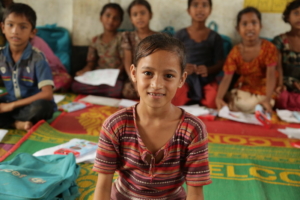Safe Spaces for Women and Girls in Bangladesh
 In light of Myanmar’s persecution of Rohingya people, approximately 850,000 Rohingya refugees have flocked to Bangladesh’s Cox’s Bazar refugee camps in search of shelter. To protect Rohingya women facing gender-based violence in these camps, UNICEF supports 15 Safe Spaces for Women and Girls in Bangladesh. The spaces not only protect women from partner violence and abuse, but they offer a myriad of services designed to support mental health and foster skills training.
In light of Myanmar’s persecution of Rohingya people, approximately 850,000 Rohingya refugees have flocked to Bangladesh’s Cox’s Bazar refugee camps in search of shelter. To protect Rohingya women facing gender-based violence in these camps, UNICEF supports 15 Safe Spaces for Women and Girls in Bangladesh. The spaces not only protect women from partner violence and abuse, but they offer a myriad of services designed to support mental health and foster skills training.
Fostering a Safe Environment
The Safe Spaces’ primary purpose is to protect Rohingya and local Bangladeshi women from gender-based violence in Bangladesh’s Cox’s Bazar refugee camps. Specifically, amid Bangladesh’s nationwide pandemic lockdown in the first half of 2020, UNICEF anticipated skyrocketed rates of sexual exploitation and marital abuse. As a result, these spaces offer psychological care and case management in an open and safe environment.
Beyond protection services, volunteers at these Safe Spaces conduct house visits in communities surrounding the refugee camps. The volunteers share information about the pandemic and raise awareness surrounding gender-based violence. Their door-to-door visits encourage women to report incidents of abuse and shed light on how Safe Spaces for Women and Girls in Bangladesh are attempting to tackle gender-based violence.
Providing New Opportunities
The spaces also provide women with skills training for employment opportunities. According to UNICEF, the spaces teach women how to sew and embroider thus empowering Rohingya refugees to be economically independent once they leave the Safe Space. In fact, UNICEF reports that some women are able to earn over $100 a month, enabling women to provide for their children and gain power in terms of household dynamics. Furthermore, considering that 55% of the camp consists of children under 18, skills training allows young women to get a head start on developing crucial skills for the workforce.
Cultivating Camaraderie Between Communities
Although Safe Spaces were originally designed for Rohingya refugees, they are now open to local Bangladeshi women as well. As a result, Rohingya and Bangladeshi women have bonded over their similarities—such as facing gender-based restrictions in daily life. These centers’ emphasis on psychological support and skills training allows both Rohingya and Bangladeshi women to foster tight-knit relationships within the sanctuary.
A Hopeful Future
As hundreds of thousands of Rohingya people still reside in Cox’s Bazar as of late 2022, Safe Spaces for Women and Girls in Bangladesh continue to protect women from outside threats. In Safe Spaces, women learn the necessary skills for entering the workforce while fostering relationships with other women in their communities. By empowering persecuted refugees, Safe Spaces are effectively cultivating a brighter, more optimistic future for thousands of Rohingya women across Bangladesh.
– Emma He
Photo: Flickr
